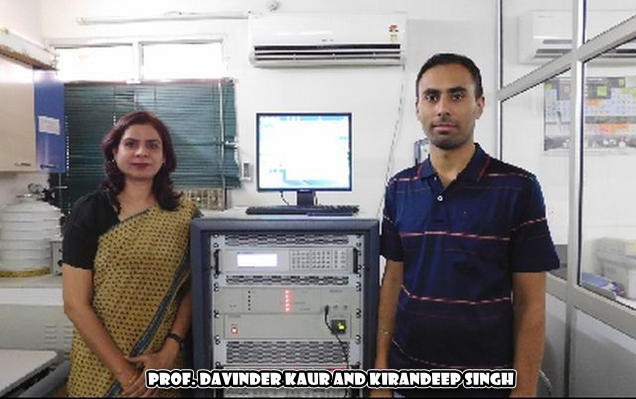IIT Roorkee team develops a four-logic state memory device
Navneet Kumar Gupta
• The memory device works on Four-Logic States as opposed to the current binary state
• The device has shown an improvement in memory close to 140%
Thanks to computation & ICT, we are living in an era of unprecedented access to information. Today, a whole universe of data is available at the click of a button. This is also an era of Big Data, where thanks to the power of computers to store & process information, today we have the largest amount of digital & numerical data than at any time in history. Scientific data – like genome mapping or physics experiments like the LHC – that generate millions of information packets. Weather data from land, sea and atmosphere that’s processed by supercomputers. There is information swirling around us all the time in humungous volumes, ready to be processed, understood & used.
Now Researchers at the Department of Physics & Centre for Nanotechnology at IIT Roorkee have got a massive breakthrough in memory device technology, which could propel the world towards the next level of ‘Super Computing’. The team has developed a high-density, energy-efficient, four-logic state memory device which could provide a massive boost to the overall computing processes and memory-intensive tasks like video and multimedia signal processing, pattern recognition, virtual reality, artificial intelligence and machine learning.
The device called Magnetoelectric Random Access Memory (MeRAM) has immense potential to be used in future memory chips for almost all electronic applications, including smart-phones, tablets, computers, microprocessors, and for large data storage. This four-logic state memory device was fabricated in Functional Nanomaterials Research Laboratory, I.I.T Roorkee using Magnetron Sputtering technique.
[post_ads]
Till now this technology was not utilized worldwide due to the lack of control over the four-logic states. Researchers across the world has achieved the four-logic states, but were not able to distinguish and separate them, due to which the utilization of the same became impossible. The research team at IIT Roorkee got the breakthrough and managed to separate and distinguish the four-logic states, thereby getting a step closer to the fastest and the most efficient computing technology available in the world.
Speaking about the achievement, Prof. Davinder Kaur Walia, Department of Physics & Centre for Nanotechnology, Indian Institute of Technology Roorkee said, “The world is rapidly moving towards faster, smaller and quantum technologies, which has created an ever-increasing demand for small and more efficient devices and technology. Our focus was to achieve a four-logic state as we knew that with that achievement, we will be able to create a device which could probably usher in a new technological revolution.”
“To achieve this, we used a new material called Ferromagnetic Shape Memory Alloys (FSMA) and the concept of composite barrier were chosen, which helps us in achieving the goal of distinguishable memory logic states. The current ultimate memory cell has shown a tremendous improvement of nearly 140 % in the memory functions.” she added.
The key feature of the device is that it shows a four-logic state resistance which can be tuned both by electric as well as magnetic field. Further it utilizes voltage instead of large electric current to switch the magnetic bits and write data into the memory. Hence it is more energy efficient and dense and can bring down the cost per bit. MeRAM’s key advantage over existing technologies is that it combines extraordinary low energy with very high density, high-speed reading and writing times, and non-volatility — the ability to retain data when no power is applied.
------------------
 Navneet Kumar Gupta is a science communicator working as a Project Officer (Edusat) in Vigyan Prasar-National institute of Science communication under the Department. of Science & Technology. Govt. Of India. He has deep interest in popular science writing for general public through Print and electronic media. Besides his twelve books, he has written more than 200 popular science articles. He has edited/authored/co-authored more than 10 books. He have been awarded six National Awards including Rajbhasha Award, Ministry of Home Affairs, Government of India He has had a long stint as Associate Editor, VIPNET news - a popular science magazine. You may contact him at - ngupta@vigyanprasar.gov.in
Navneet Kumar Gupta is a science communicator working as a Project Officer (Edusat) in Vigyan Prasar-National institute of Science communication under the Department. of Science & Technology. Govt. Of India. He has deep interest in popular science writing for general public through Print and electronic media. Besides his twelve books, he has written more than 200 popular science articles. He has edited/authored/co-authored more than 10 books. He have been awarded six National Awards including Rajbhasha Award, Ministry of Home Affairs, Government of India He has had a long stint as Associate Editor, VIPNET news - a popular science magazine. You may contact him at - ngupta@vigyanprasar.gov.in
